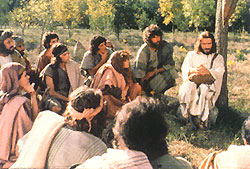Much of what comes later in the gospels appears to be additions to the story in order to bolster the Church's claim that Jesus had risen body and soul from the dead. Whatever.
 What follows is the sense I make of Easter from where I am now in my life. This is based, mostly, on the versions of the story contained in the Bible. I'll conclude with my own take on the Church's story.
What follows is the sense I make of Easter from where I am now in my life. This is based, mostly, on the versions of the story contained in the Bible. I'll conclude with my own take on the Church's story.Despite my misgivings, what a powerful story this is. Not the whole death and rising from the tomb thing, but before that. The amazing part of the story for me, now more than ever, is Jesus' complete surrender into His knowledge that He was aligned with God's plan (or what I might think of as the Eros of the Kosmos). That kind of surrender is foreign to me, struggling as I am with my rational need for control.
But the cross represents complete surrender to me. It has always been a powerful symbol, even before Jesus was nailed to one. In the earliest cave paintings, shamans are often depicted with their arms outstretched and their legs together in the form of a cross.
 In many cultures around the world, the cross has been a symbol of the human body. It seems almost appropriate, given the history of the symbol (a history of which the early Christians must have had some vague intuition), that Jesus would shed His body upon the cross so that His Spirit could be freed.
In many cultures around the world, the cross has been a symbol of the human body. It seems almost appropriate, given the history of the symbol (a history of which the early Christians must have had some vague intuition), that Jesus would shed His body upon the cross so that His Spirit could be freed.To me, it seems, Jesus was limited in His expression of divinity by being bound in a mortal body. He suffered the same doubts and temptations all of us suffer, but He was strong enough to resist. As he faced death, He still shared his teachings with those dying alongside Him and with His followers on the ground the below.
Even in that final surrender that to me is the most amazing part of the story, Jesus for a moment feared that He had been forsaken on the cross by His God, that He was suffering not for the sins of humanity, but because of them.
And both things are probably true -- they are inseparable.
But my point is that Jesus, being a Jewish Rabbi living in Iron Age Israel, was limited by His humanity. He was deeply human in every possible way, and with that, no matter how many miracles were performed through Him, He was limited in His expression of His divinity. Spirit is so much more vast than anything that can be expressed through our small, fragile, human bodies.
Jesus needed to die on the cross to be freed from limitations. He loved humanity enough to surrender His life for what He believed. But in death, He became Spirit (or God), and from that vastness, He could fully love each and every one of us.
That's my take on the official story of Easter.
Personally, I believe that Jesus had experienced some form of enlightenment consciousness that He then tried to integrate into His teachings as a Rabbi. There are many versions of where Jesus was during the "missing years," and some people believe he actually journeyed to India. Maybe, but the evidence does not support such claims.
More likely, He became associated with one or more of the gnostic cults that existed, who later took Jesus as their leader. To the pharisees, such teachings were heresy. Jesus threatened to undermine their control and their livelihood through His teachings of love and compassion.
 Most importantly, Jesus undermined them through His teachings that the Kingdom of God is within each of us, to be found through introspection and self-knowledge (certainly gnostic in this regard). And further, that we grow closer to the Kingdom of God through compassion and generosity, and through not clinging to egoic desires for wealth and comfort.
Most importantly, Jesus undermined them through His teachings that the Kingdom of God is within each of us, to be found through introspection and self-knowledge (certainly gnostic in this regard). And further, that we grow closer to the Kingdom of God through compassion and generosity, and through not clinging to egoic desires for wealth and comfort.For this, both the Jewish establishment and the Roman rulers feared Him. He threatened the status quo and, in their eyes, He needed to be eliminated. He died because He was teaching a worldcentric message in a land struggling with the transition from egocentric culture into ethnocentric culture. He threatened to disrupt the fragile balance of power that existed.
Even as a non-Catholic, I can hold Easter as a day on which we celebrate the life and death of a man who was far ahead of His time. He was not the first enlightened teacher to be killed for His teachings, and He certainly was not the last. But few others have so greatly impacted -- for better and worse -- the course of human history.
1 comment:
Yesterday I went to church on easter for the first time. I grew up the daughter of a lasped catholic of a devout woman. Both of thsee women raised me. I don't understand why it was so important to me that I go but sitting there I had an awakening. I want to go back to the church. Strange for those of you who know me but I do. The entire process became meaningful to me. Getting dressed in the pretty white dress, then walking out and having my father and my boyfriend look so proud of me. Being in the church with all those people. Sunday dinner. Each moment shined for me, I spent the whole day happy. Beyond the actual story and do you believe the process, the actions can be a form of meditation. That is the part of the church I want to bring into my life.
Erica
Post a Comment